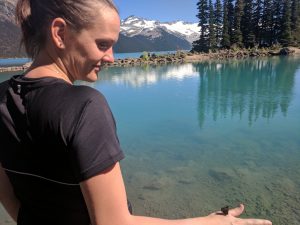 I am not a teacher. I once thought that I would be, but after completing my Bachelor of Education in Secondary Sciences I decided that it was not for me. However, education is a passion of mine and I hoped to remain in the field in some capacity. Shortly after graduating, I got a job at the University of Alberta working in Student Services which afforded me a few opportunities to develop media for students, like a monthly newsletter and an interactive program planning tool. This experience emphasized my technological skills and exposed my love for creating media. Because of this, I decided that I should pursue a career that would allow me to construct technologically-delivered educational content. I wanted to become an e-learning designer.
I am not a teacher. I once thought that I would be, but after completing my Bachelor of Education in Secondary Sciences I decided that it was not for me. However, education is a passion of mine and I hoped to remain in the field in some capacity. Shortly after graduating, I got a job at the University of Alberta working in Student Services which afforded me a few opportunities to develop media for students, like a monthly newsletter and an interactive program planning tool. This experience emphasized my technological skills and exposed my love for creating media. Because of this, I decided that I should pursue a career that would allow me to construct technologically-delivered educational content. I wanted to become an e-learning designer.
There are so many opportunities for e-learning designers and I love the idea of being able to create something lasting and independent of myself (unlike a lesson I might deliver in-person) that people can learn from. Ideally, I would like to get involved in the corporate world, constructing and maintaining training modules for employees. I think this would be a great way to harness my career goals with the added bonus of constantly learning all sorts of different things from the wide range of content I will work with.
But, before I will be qualified for these types of positions, I need to expand my background in technology and adult education. My primary learning goals for my formal education are 1) to gain as much knowledge as I can about adult learning and design theories and 2) to gain experience with a wide variety of learning tools, applications, and Learning Management Systems (LMSs). I want to be able to offer my employers technological skills and products of my work that are supported by a foundation of proven findings and theoretical frameworks. The job research that I have done indicates that I will need a strong grasp of the ADDIE model (Molenda, 2015), SCORM (Papazoglakis, 2013), SECTIONS (Bates, 2014), and the Web Content Accessibility Guidelines (Ribera et al., 2009) and skills using various LMSs (Moodle, Canvas, Blackboard) and course authoring software (Articulate Storyline, Adobe Captivate, Composica). From what I can tell, I will be able to meet most of my theoretical and LMS learning goals while taking the MET program but I may have to find alternative means for learning to use course authoring software.
I also hope that the MET program will expose me to some unfamiliar contexts that learning technology can be used in. Although I have a pretty clear idea of where I would like to end up, it is still early in my career pursuit, and it would be wonderful to learn about all the different places where my new knowledge and skills will be valuable. This is one of the reasons I am planning on taking ETEC 522, Ventures in Learning Technology, as I believe it might give some perspective on how MET students can contribute in settings other than educational institutions. I also think it might be a good opportunity to obtain some resources in the corporate field and possibly do a bit of networking. If anyone has taken 522 and would like to tell me about it, that would be great. Send me an email!
For ETEC 565A in particular, I hope to expand my experience with LMSs and explore some platforms that I am not yet familiar with. I also think that the section on copyright will be highly relevant, because there are no copyright regulation allowances for businesses like there are when using media for educational purposes. For of interests’ sake, I am also looking forward to the sections of mobile learning and media, simply because of their prevalence in today’s society.
Thanks for reading about my flight path and I look forward to building connections with everyone throughout the course!
Katie
References
Bates, T. (2014). Choosing and using media in education: The SECTIONS model. In Teaching in digital age.
Molenda, M. (2015). In Search of the Elusive ADDIE Model. Performance Improvements, 54(2), 34-36.
Papazoglakis, P. (2013). The Past, Present and Future of SCORM. Academy of Economic Studies: Economy Informatics, 13(1), 16-26.
Ribera, M., Porras, M., Boldu, M., Termens, M., Sule, A., & Paris, P. (2009). Web content accessibility guidelines 2.0. Program, 43(4), 392-406.